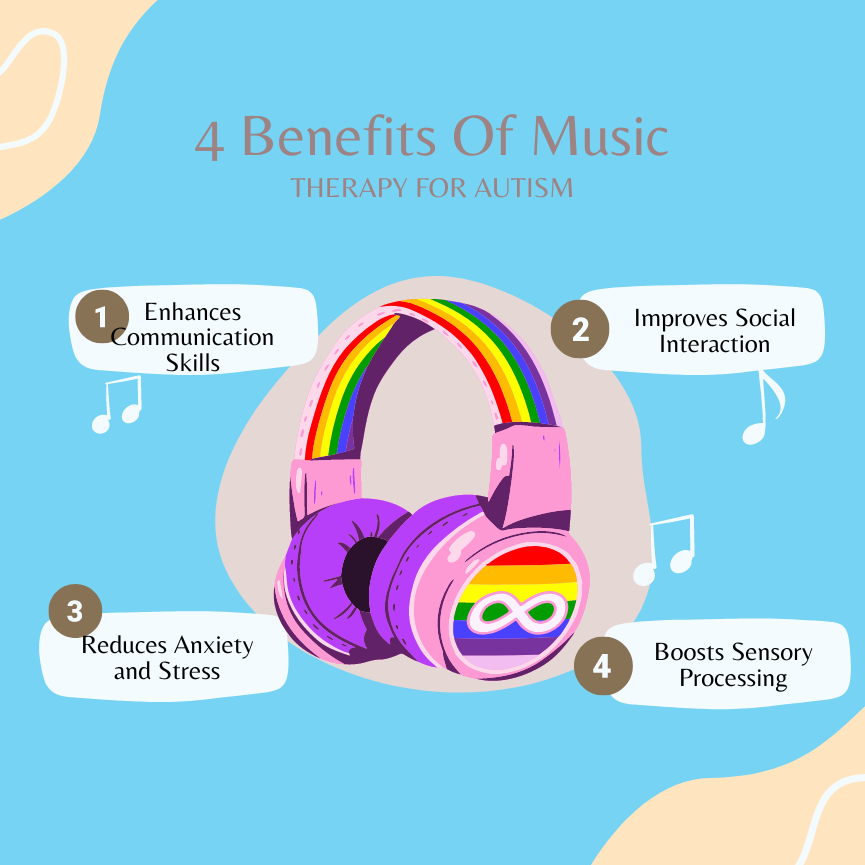
- May 20, 2024
- 131 Views
- 0 Comments
Benefits Of Music Therapy For Autism
“Where words fail, music speaks.” Hans Christian Anderson
Our autistic children occasionally exhibit agitation, or anxiety, or are just bored and preoccupied. As parents, of course, we want the best for our children, particularly those with Autism Spectrum disorder. One of those ways we can keep our kids satisfied and happy and also aid their development is through music therapy.
We have all experienced the power of music in our lives.
Music and special needs children, too, have an extra special relationship. Music therapy for autism can positively impact a variety of Special needs.
What is Music Therapy?
A qualified professional who has successfully completed an accredited music therapy program practices music therapy, which is the clinical and evidence-based use of musical interventions to achieve specific goals within a therapeutic relationship (American Music Therapy Association). Music Therapy may include:
- Listening to music
- Singing along with the music
- Moving to the beats
- Meditating
- Playing an instrument
So how does Music Therapy help children with Special Needs? These are a few examples of how.
Motivtion for Autistic children
It is often difficult to find ways to motivate children with Autism to work on challenging tasks. With the use of music, children are more motivated to complete tasks that may otherwise seem tough or uninteresting.
For example, using different instruments to create sounds and thus encouraging the development of motor skills.
(Check out the GodsOwnChild Range of musical instruments to keep your child amused and motivated)
Multi-sensory development for children with autism
While creating music, an Autistic child is encouraged to use multiple senses.
For example, a child hitting a drum with a mallet may seem very simple.
However, when one really breaks it down, one realizes that there are so many senses involved. Their tactile system is engaged because they can feel the mallet in their hand.
Their kinesthetic system is activated as they move their arms to hit the drum.
As they listen to the drumbeat, their auditory system is engaged and it also helps develop their eye hand-or-ordination as they track their hands along with the mallet.
Use of both hemispheres of the brain
While creating music, research shows that many regions of the brain are activated simultaneously. For children with Special Needs, this is a very important aspect.
Non–verbal
Very often children with Special Needs may have limited vocabulary and speech or may even be non–verbal.
This is when music helps bridge the gap. The unspoken power of music is often more effective than spoken language.
Such type of non–verbal therapy can help children feel more comfortable and be a source of huge relief for them to express themselves.
Music bonds and aids happiness in our special needs children
Research shows that the ‘bonding’ or ‘cuddle’ hormone, Oxytocin is released while listening to or making music. This ‘love’ hormone allows people to connect and bond at a deeper level.
Along with the above-mentioned reasons, music is also known to provide several other health benefits such as boosting immunity, lowering stress levels, improving memory and many more!
References
Longhurst, S. . (2020, January). The Uses and Benefits of Music Therapy. Retrieved February 2021, from Healthline: https://www.healthline.com/health/sound-healing
What is Music Therapy? (n.d.). Retrieved February 2021, from American Music Therapy Association: https://www.musictherapy.org/about/musictherapy/
What are Special Needs? (n.d.). Retrieved February 2021, from study.com: https://study.com/academy/lesson/what-is-special-needs-definition-types-law.html
Judd, R. (2014, January ). There are five reasons why music benefits special-needs kids. Retrieved February 2021, from Special Needs Resources: https://www.friendshipcircle.org/blog/2014/01/13/5-reasons-why-music-helps-children-with-special-needs/



Comments - 0 comments till now